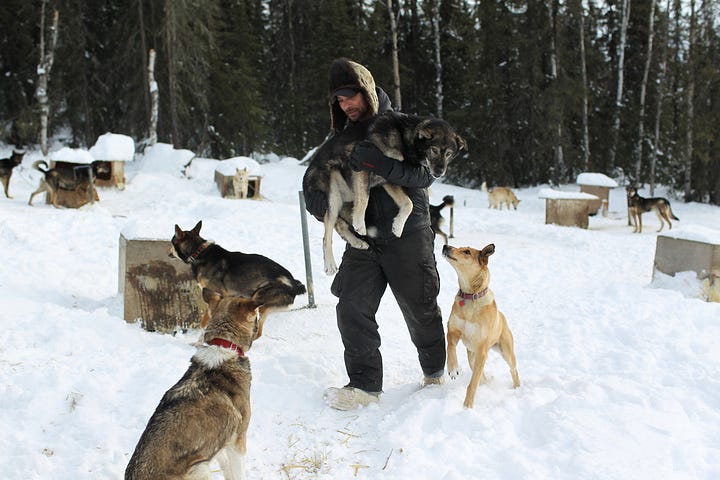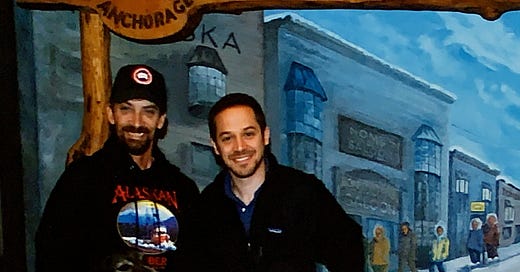Year-End Remembrances Part 2: Lance Mackey and Mike Leach
A mercurial Iditarod legend, and an eclectic football coach
Welcome to part 2 (of 3) in my year-end series.
As I mentioned in part 1: on September 7, November 4, December 9, December 11, and December 12, a prominent person I knew passed away. They ranged from someone I simply shared a meal with to a personal role model.
I’ll share how I knew each person, and something I learned from or valued in them. Let’s begin…
Lance Mackey (1970 - 2022)
There have been times in the Iditarod — the thousand-mile dogsled race across Alaska — when a sleep-deprived musher crossing the frozen Bering Sea has gazed into the blazing sun and disrobed, only to find that it’s -50° out. The Iditarod can do strange things to people, and it attracts some strange people to begin with.
If you have to be a little unusual to win the Iditarod, you probably have to be somewhat more unusual to win it four times in a row, like Lance Mackey did, from 2007 to 2010. And if that’s true, what kind of person do you have to be to also win — in two of those years — the Yukon Quest, the world’s other 1,000-mile dogsled race, which is just a few weeks before the Iditarod? Lance Mackey was an extremely unusual, and exceptionally determined dude.
He won those races with an unorthodox strategy. He called it his “marathon style.” It basically meant keeping his sled going at a slow or moderate pace for 100 miles at a time while he took quick naps. Prior to Lance, the typical strategy was to sprint from one rest stop to the next, more like intervals than a marathon. It turned out to be a brilliant, game-changing strategy.
--
I first learned about Lance Mackey after the 2010 Vancouver Winter Olympics, where I was working as a reporter for Sports Illustrated. The Olympics were such intense work — writing for the magazine and web meant multiple stories every day — that SI basically didn’t keep track of me for two weeks afterward.
So my family used that time for a dogsledding-and-camping trip over the frozen Boundary Waters in Minnesota. (This was my now-wife’s first ever experience of camping. And so it was that her first ever night of camping was in -14°, sleeping on a frozen lake. Go big or go home, right?! I got the feeling from her mother that, should we all be found dead and frozen, I’d better be naked, and she’d better be wearing all of our clothes.) It was on that trip that a guide told me about Mackey, and how the Yukon Quest/Iditarod double had been thought impossible. Sounded like a story to me.
So I went out to Fairbanks, Alaska, where Lance was living, and found a story quite different from what I expected. Over a few days, he had me help out in his dog farm (I saw a puppy birth!) while we talked. I learned that Lance’s marathon style was born from necessity. When he started, he couldn’t afford the sleek and exquisitely bred speedster huskies that other competitors were using. A decade before his first Iditarod win, Mackey’s life was a shambles.
At that time, Mackey and his wife, Tonya, were both addicted to cocaine, and in the habit of using Tonya’s daughter from a previous marriage as a designated driver. She was nine.
On Lance’s 28th birthday, they decided to get clean. They up and moved nearly 500 miles south from their home in Nenana, Alaska, to the Kenai Peninsula, and spent a summer living under a tarp on the beach, watching a battery-powered TV and cooking flounder over a campfire. Lance worked in construction, on fishing boats, and at a local sawmill until the family could make a down payment on some property, where they built a log house and insulated it with clothes from the Salvation Army. He cared for Tonya’s three children like they were his own.
Lance started taking in street mutts, and dogs that other mushers didn’t want. He bought Rosie for $100. She didn’t have great top speed, but she would happily trot for hours on end. His “trotting tornado,” he called her. What he couldn’t get in speed, he made up for by buying and breeding dogs for qualities like an ability to fall asleep quickly, or willingness to eat any time food was set down, so fueling during the journey was quick and easy. He bred dogs that had Arctic-adapted webbed feet. More than anything, he chose and bred dogs for their desire to run. (One of the days I worked in his dog yard, I made the novice mistake of blithely walking out among the dogs while holding a racing harness; I learned the literal meaning of “dogpile.”)
No sooner had Mackey kicked his addiction and started racing, than he found out he had throat cancer. A softball-sized tumor was removed from his neck, and his salivary glands went along with it. He had to learn to keep his throat moist with fruit cups during races, and the skin on one side of his neck was so thin that he had to be careful of dog scratches. Radiation treatments caused some nerve damage, and intense pain in Mackey’s left index finger. So he persuaded a doctor (not the first one he asked) to cut it off. I think Lance wryly enjoyed having an excuse to point at things with his middle finger.
--
If Lance’s life had been made into a Hollywood movie (it was in development at one point), he would dogsled off into the sunset. But success wasn’t easy on him. Tonya told me that she would’ve returned to live under the tarp on the beach in a heartbeat. The Mackeys were celebrities in a small town, and she found the attention oppressive. And, unsurprisingly, competitors started mimicking Lance’s strategy. After his four-peat, Lance never again placed higher than 16th.
In 2011, he and Tonya split up. In races, Lance was struggling with a circulation problem that left his fingers so cold he struggled to change his dogs’ booties. (He later said a doctor told him it was Raynaud’s syndrome, or at least a similar manifestation, possibly caused by radiation treatments.) In 2015, struggling with his hands, Lance finished 43rd. “I love this sport,” he tearfully told an Iditarod TV team. “I can’t do it no more.” His brother Jason, also a competitor, had hung back that year to help him. After the race, Jason said it would be Lance’s last Iditarod, “unless they can come up with bionic hands.”
Of course, Lance started anyway in 2016. But he didn’t finish. He didn’t enter the race for the next two years. In 2020, he raced again, carrying his mother’s ashes in his sled, but he was disqualified after he tested positive for meth. He went to rehab. Months later, his partner Jenne — with whom he had two kids — died when her ATV rolled over in Fairbanks.
Lance’s life was an oscillation of tragedy and triumph. I’ll never forget talking to him about how he developed his ground-breaking style. He could either look at his well-equipped competitors and give up before he started, or look for a different way to do things. I thought about that often in navigating my own career.
Earlier this year, an exam after a car accident found more cancer. According to the AP, Lance was asked by the Iditarod website whether he was scared. He replied: “I’m not fearing nothing. You know, it is what it is, but I’m not any different than the rest of the people on the planet. When it’s my bus stop, I’ll get off.”
One month later, on September 7, he passed away.


Mike Leach (1961 - 2022)
Mike Leach died on December 12, from complications related to a heart condition. Leach — who didn’t play football after high school but did go to law school — was best known as an innovative college football coach whose “Air Raid” offense spread wide receivers all over the field and threw the ball like crazy. It was a literal game-changer.
He was also known for answering any question from a reporter, in detail, whether it be about how to survive your wedding, candy corn, or how Pac-12 mascots would fare in a fight:
“Well, first of all, what kind of mythical powers does a Sun Devil have? We gotta consider that….The Duck might lose interest and just fly away and get out of there, which may be good advice under the circumstances.”
I had the pleasure of joining Mike and a few others for a meal in 2019, following the MIT Sloan Sports Analytics Conference. The final panel of the conference featured Michael Lewis — author of Moneyball, The Big Short, and other books — interviewing Mike Leach. Leach was digressive (my kind of guy!) and hilarious.
Here’s the story that ended the panel:
One season, while Leach was coaching Texas Tech, the team was having kicking troubles. Not just missing field goals, but also extra points, which are usually perfunctory. Leach said that the team had a powerful, highly recruited kicker who could “damn near bust the windows on the offices in the end zone of the stadium,” but he wasn’t handling the pressure of the college game well. A second kicker wasn’t working out, either.
As it happened, an early-season game against Massachusetts featured a promotion in which a spectator pulled out of the stands had an opportunity to win a few months of free rent by kicking a 30-yard field goal. That day, the kid whose name was chosen from a signup sheet was an education major who took a step or two and calmly drained it. Leach sent a staff member to grab the kid as he walked back to the stands. And that’s how Ed Lynnwood became the Texas Tech kicker.
An important thing to know about Ed Lynnwood is that his name wasn’t Ed Lynnwood. Leach liked the name “Ed” because it was easy to remember and quick to say. And Lynnwood Townhomes had sponsored the win-a-month-of-rent contest, so Leach just named his kicker Ed Lynnwood. (His real name was Matt Williams. And he had to forgo the free rent in order to join the team, presumably because it would have been an impermissible benefit for a college athlete.)
Leach described Lynnwood’s personality as “a little like Jeff Spicoli on ‘Fast Times at Ridgemont High,’ which is kind of what I was looking for out of a kicker.” He told Lynnwood that they were preparing to play 10th-ranked Kansas, at Kansas. “Look, we want you to kick extra points this game. How do you feel about that?” Leach recalled asking.
“Good,” he recalled Lynnwood replying. “Shouldn’t be too hard. It’s only three yards…well, I guess there’s the ten for the end zone, but it’s only about three yards. I’ll probably make all of them. I’m human, I’m not perfect. I might miss one, but I’m not going to miss very many. I’m probably going to make all of them.”
Leach: “Well, there’ll be a bunch of people there yelling and stuff. Does that bother you?”
Lynnwood: “Nah I don’t think it will, because I’ll just take my steps, and, ya know…”
When the Kansas game rolled around, and Texas Tech was getting close to scoring its first touchdown, several coaches noticed that Lynnwood wasn’t warming up. One by one, they started alerting him that he might want to begin warming up.
“I got this, don’t worry about it,” Leach remembered Lynnwood saying. And then another concerned coach approached him. “I’m fine,” he said.
And then, Leach said, a third coach approached him. Lynnwood got exasperated. “It’s only three yards!”
Texas Tech ended up trouncing Kansas, 63-21, which meant there were a lot of extra points. “Ol’ Lynnwood hit nine of those suckers,” Leach said. “So then they left him alone after that.”
--
At dinner that night, Leach was exactly the same as he was on the panel. Funny, familiar, and digressive. An old-school raconteur who had something interesting to say about everything.
I’m digressive too. Sometimes I’m self-conscious about it. Leach clearly wasn’t. We all need role models, even us digressives. Thanks for a great example, and a great memory, Mike.
Next week’s post will be the last one in this series, and the last one of the year. It will focus on someone who instantly made me want to be a better person.
If you enjoyed this post, a great way to support Range Widely is to share it.
If you aren’t subscribed, you can become a free or (voluntary) paid subscriber here:
Finally, If you want to hear Leach tell the story with his wonderful and idiosyncratic inflections, you can watch him here.
Thank you again for reading.
David






These pieces have been so delightful to read. Thank you for sharing. The Leach video was really captivating.
Another pair of beautiful tributes. Thanks, David! I remember reading about Mackey in The Sports Gene, but it's so insightful to hear this extra background. And I respect your effort to capture his complexity – I feel like there's a tendency to only focus on the good in remembrances, so kudos to you for avoiding that here. As far as Mike Leach, what a character. I had a hoot watching every video you linked to. He must have been so fun to cover as a reporter.
I couldn't help but ask: are your travels usually as adventurous as camping in (very) sub-freezing temperatures??